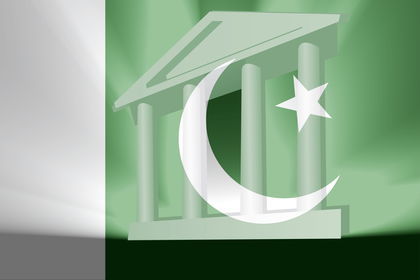Pakistan - Judicial system

Pakistan's judicial system stems directly from the system that was used in British India. The Supreme Court has original, appellate, and advisory jurisdictions. The president of Pakistan appoints the justices. Each province has a high court, the judges of which are also named by the president. Below the high courts are district and session courts, and below these are subordinate courts and village courts on the civil side and magistrates on the criminal side. There are no jury trials in Pakistan.
The British tradition of an independent judiciary has been undermined in Pakistan by developments over the last 50 years. In May 1991, for example, the National Assembly adopted legislation which incorporated the Islamic legal code, the Shari'ah into Pakistan's legal system. A Federal Shari'ah Court has the power to nullify any law it finds repugnant to Islam.
Courts in Pakistan are also subject to pressure from the executive branch, in part because of presidential power over transfer and tenure of high court justices and lower court judges. Judges in the special courts are retired jurists hired on renewable contracts so that their decisions may be influenced by a desire for contract renewal. Nonetheless, the provincial high courts and the supreme court have exercised some degree of independence in handing down a number of cases against the government. In 1996 the supreme court issued orders curtailing the powers of the executive to appoint and transfer high courts' judges.
Again, in late 1997, the issue of the appointment of judges to the supreme court led to deteriorating relations between Prime Minister Nawaz Sharif and the chief justice of the supreme court, Sajjad Ali Shah. In November, the supreme court brought charges of contempt against Nawaz Sharif, but the chief justice was forced out of office before a verdict could be handed down (a guilty verdict would have disqualified Sharif from office).
The position of the judiciary in Pakistan has also been affected by periods of military rule in the country. When General Zia al-Huq imposed martial law in 1977, military courts were given jurisdiction over trial and punishment of civilians found guilty of violating martial law regulations. The verdicts could not be appealed to a higher civilian court. Moreover, a provision of the 1973 constitution that judges could be removed only by the supreme judicial council, consisting of the chief justice and two ranking judges from the supreme court and the high courts, was revoked by the military government in June 1979. Under the 1981 interim constitution, a new oath was imposed on all supreme court, high court, and Shari'ah court judges, and all laws promulgated by the martial law regime were exempted from judicial review. The supreme court chief justice and several other judges were replaced after refusing to take the oath. Although the military courts were abolished in December 1985, their decisions still cannot be appealed to civilian courts.
Similarly, in January 2000, Musharraf required all judges to take an oath of loyalty to his regime. The supreme court chief justice, Saiduzzaman Siddiqui, and five colleagues refused and were dismissed. This was just a week before the court was due to hear the first of several cases challenging the legality of the new government. Legal experts argue this action did irreparable harm to Pakistan's judiciary; with all sitting judges having accepted the military regime, there is no independent judiciary to protect the constitution.
I do not believe that next judges after CC iftekhar Muhammad chaudry will do a best job like him.if our govt, pass a bill for judges that their appointment will be for life till to there death or resign then it will good for us as it is in America.
Zeeshan Bahadur
Layyah.